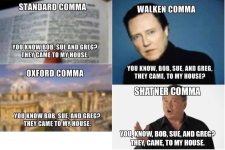Voyeurkenneth
Peeping
- Joined
- Aug 18, 2023
- Posts
- 139
Grammar alert! Do you personally forgo a question mark for dialogue that doesn't sound like a question is being asked? Or do you use a "?" no matter what?
"You said you'd love me forever!" he said.
"Hah! I did say that, didn't I," she replied.
"Hah! I did say that, didn't I?" she replied.
I get context of the scene and the remainder of the dialogue can/should relay intent. But am curious if there's a prevailing convention being practiced among writers.
"You said you'd love me forever!" he said.
"Hah! I did say that, didn't I," she replied.
"Hah! I did say that, didn't I?" she replied.
I get context of the scene and the remainder of the dialogue can/should relay intent. But am curious if there's a prevailing convention being practiced among writers.

